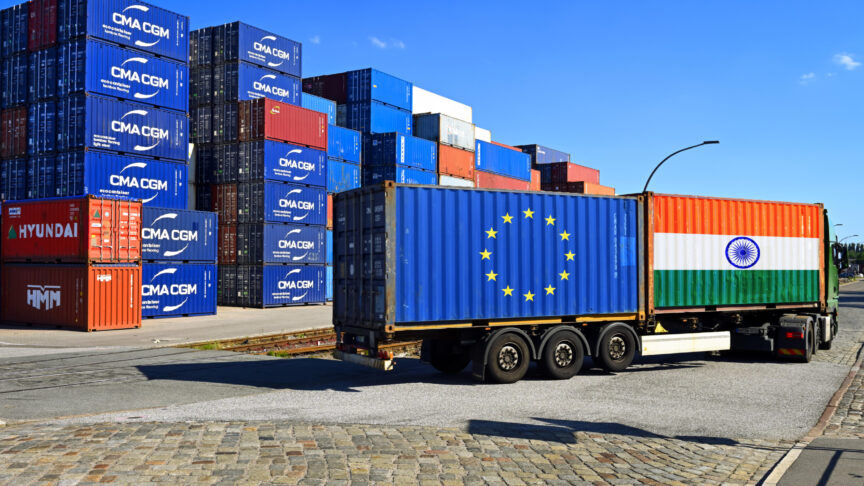No alternative: What the AfD wants for Europe
Despite its preoccupation with borders, the worldview of the AfD makes no distinction between foreign and domestic policy – and the party is using both to extend its deleterious influence.
February’s terror rampage in the German town of Hanau led to the deaths of 11 people, most of them of Turkish, Afghan, and Bosnian origin. Immediately under pressure from suspicions that there was a racist motive for the shisha bar attack, politicians from Alternative for Germany (AfD) jumped to dismiss the crime. In their words, it was the act of a psychopath that had “nothing to do with politics”; but a ‘manifesto’ uploaded by the murderer testified to his extreme Islamophobia. And the killings constituted the third deadly right-wing terror attack in just nine months: in October, the Halle synagogue shooting took place; in June, Christian Democratic Union politician Walther Lübcke was found dead outside his house, after the AfD spent months systematically targeting him on social media for his pro-migrant stance. While the AfD cannot be held directly responsible for these deeds, many of their representatives have created fertile ground for hate.
When it first emerged in 2013, the AfD set about campaigning against “Brussels Eurocracy” and in favour of quitting the euro. In a relatively short space of time, as a reaction to the arrival of almost 800,000 refugees from Syria in Germany after 2015, the party moved sharply to the right, ousted its founders, and focused on a racist, often anti-Semitic and Islamophobic agenda. Denouncing Chancellor Angela Merkel’s decision to keep the doors open and playing on fears of Islamist radicalism, the AfD entered the Bundestag in 2017. It has since followed suit in all of Germany’s state parliaments. Saxony’s election last year saw it secure no less than 27.5 percent of the vote. In the European Parliament, it has joined Italy’s League and France’s Rassemblement National in the “Identity and Democracy” group.
The AfD is now actively working on its “alternative” Europe: a chauvinistic and ultranationalist vision of nation states.
With this significant political representation, the AfD is now actively working on its “alternative” Europe: a chauvinistic and ultranationalist vision of nation states that cooperate only to advance their own economic interests and to reduce immigration – especially that from Muslim countries. For the AfD, the very idea of a more united and integrated Europe remains anathema, as does the concept of “European sovereignty”. But the party has now turbocharged this original Euroscepticism with the belief that Islam has no place in either Germany or the rest of Europe. Its constant refrain is one of accusing immigrants of extremism and representing “foreign” values, often with deeply racist language referring to Muslims as “camel herders” and Islam as a “decaying cadaver”.
Naturally, its foreign and domestic policies intertwine tightly. The party’s “Manifesto for Germany” may allocate only three pages out of 93 to foreign policy as such, but it regularly draws on international affairs with the clear aim of curbing migration or deporting migrants from Germany.
Syria remains its prime focus. While the Syrian government is leading a military campaign in Idlib that gravely harms the civilian population, the AfD is continuing to advocate the normalisation of relations with President Bashar al-Assad. This is because it seeks to advance the forced repatriation of refugees. Such a move would contradict Germany’s basic law of asylum, which prohibits deportations to war zones and countries that gravely violate human rights. But this disregard for the law of the land is indicative of the extent to which the party is willing to create a new normal for German politics. The AfD has initiated more than 100 parliamentary motions and questions to the government seeking to advance these goals since 2017. Indeed, its preoccupation with Syria runs deep. In 2018 the first of several AfD delegations travelled to Syria on a “fact-finding” mission, at the invitation of the Syrian government – only to deny evidence from the United Nations and international human rights organisations about the Syrian government’s war against civilians and widespread human rights abuses. At home, the party pushes racist narratives about Syrians and other refugees as a danger to public security and the “national identity of the German people”.
Many party representatives have been caught deploying Nazi language and anti-Semitic tropes. And the leader of an extreme wing in the party, Björn Höcke, went so far as to criticise Germany’s Holocaust memorial as a “monument of shame”. Despite this, the party has been at pains to display solidarity with Israel’s rightist parties and current leadership.
In an op-ed last year for Arutz Sheva, an Israeli news organisation close to the settler movement, deputy party leader Beatrix von Storch claimed that the AfD was “the only party that is actively fighting against radical Islamism and anti-Semitism”. The party has adopted a one-sided narrative similar to that in US President Donald Trump’s latest plan for the Israel-Palestine conflict. And, in a January 2020 parliamentary motion, it called for closer collaboration on Islamist terrorism, denounced the Palestinian BDS Movement (which promotes boycott, divestment, and sanctions against Israel) as “anti-Semitic” and the EU labelling of settlement products as “discriminatory”. All this is part of a strategy from which the AfD hopes to benefit in three ways. It can shield itself from accusations of anti-Semitism (indeed, party leaders naturally blame Muslim immigrants for rises in anti-Semitic incidents); it can claim legitimacy in the foreign policy arena, portraying itself as sensitive to German-Israeli relations; and it can pursue an affinity with Likud’s and the settler movement’s disregard for Palestinians, most of whom are Muslims.
Russia provides another example of how the AfD’s nationalist agenda translates into foreign policy. The Social Democratic Party has traditionally advocated for a closer German-Russian dialogue, while Die Linke has recently called for a softer course on Russian President Vladimir Putin. But, in German politics, it is now primarily the AfD that perceives Putin as a close ally and ideological partner. The party promotes an end to sanctions on Russia and tries to justify the country’s annexation of Crimea. It has produced more than 50 initiatives in the Bundestag calling for “cooperation instead of confrontation”, which amount to support for Putin’s autocratic course. Like other populist movements across Europe, the party receives active support from the Kremlin. The AfD also has the backing of many ethnic Germans who moved to Germany from eastern Europe in the decades following the second world war, and who share its anti-immigration and anti-Muslim agenda.
So far, all other German parties represented in the Bundestag have officially ruled out cooperation with the AfD. Indeed, it was the fraying of this cordon sanitaire that led to the downfall of Annegret Kramp-Karrenbauer as Merkel’s anointed successor last month, when Christian democrats in Thuringia voted for a candidate for minister president whom the AfD also backed. A state parliamentary vote – which would normally have won minimal attention even within Germany – transformed into a crisis reported across the world. The AfD is now the principal opposition party in the Bundestag. And the Altparteien (old parties) it revels in disdaining have struggled to counter its explosive anti-European and anti-Muslim narrative. The AfD’s connections with successful populist movements and nationalist leaders elsewhere in Europe only increase the likelihood that it will have an irreversible impact on Germany’s politics, with potentially deep consequences for the entire continent.
The European Council on Foreign Relations does not take collective positions. ECFR publications only represent the views of their individual authors.


